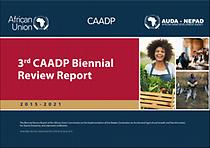
Report
3rd CAADP Biennial Review Report 2015 -2021 : The Biennial Review Report of the African Union Commission on the Implementation of the Malabo Declaration on Accelerated Agricultural Growth and Transformation for Shared Prosperity and Improved Livelihoods. Assembly Decision (Assembly/AU/2(XXIII)) of June 2014
Attachments [ 1 ]
More Details
1. We are pleased to present to you the Third CAADP Biennial Review Report which is the main mutual accountability tool to track the progress of the African Union (AU) Member States in implementing the Malabo Declaration, with 51 countries reporting in 2021 – up from 49 countries in 2019 and 43 in 2017. 2. This report was endorsed by the assembly of African Heads of State and Government during the 35th Ordinary Session of the Assembly of the African Union Heads of State and Government in February 2022 - Assembly/AU/Draft/Dec.7(XXXV) 3. In essence, the Malabo Declaration provides the direction for Africa’s agricultural transformation for the period 2015 – 2025, within the Framework of the Comprehensive Africa Agriculture Development Programme (CAADP), as a vehicle to contribute to the achievement of the objectives of the First Ten-year Implementation Plan of Africa’s Agenda 2063. 4. The current report is being released in a special context, against the backdrop of the COVID-19 pandemic outbreak that started in early 2020, which has had a toll not only on the health of our population but also our economies including the agriculture sector. This unprecedented pandemic affected food systems in many ways by disrupting the input and output markets, as well as the production of the various commodities mostly undertaken by smallholder farmers consisting of mainly women and youth, as discussed during the Ministerial meetings convened in April and July 2020, jointly by the AUC and FAO, on the impact of this health crisis on the agriculture sector. The effects of the pandemic on Africa’s food systems is being compounded by other shocks during the reporting period. These include the locust outbreaks in 2020 which affected the countries in the horn of Africa, the fall armyworm in 2018 and 2019; and extreme weather patterns due to climate change. The rising security challenges posed by terrorism threats in the Sahel region is also noteworthy as we are reporting on the performance of the affected countries against the Malabo targets. 5. This state of play clearly points to the need for strengthening the resilience of our food systems, as envisioned by the UN Secretary General, H.E. Mr. António Guterres while convening the United Nations Food Systems Summit this year in September in New York, which was timely and resonates well with the theme of the 3rd BR report: “Accelerating CAADP Implementation for a Resilient African Food System”. In keeping with the commitment for Africa to speak with one voice in international fora, the African Union Commission (AUC) and AUDA-NEPAD in collaboration with the UNECA formulated an Africa Common Position to the UNFSS that was endorsed by the Extra-Ordinary Session of the STC on ARDWE in July 2021. The common position was presented by the Commissioner for DARBE, on behalf of the AU Chairperson, in September 2021 during the UNFSS. 6. This third CAADP BR Report is also timely in capturing the progress made by African Union Member States mid-way through the implementation of the Malabo commitments and goals to be achieved by 2025 and embarking on preparation of the second AU CAADP Business Plan for the 2022-2025 period. Thus, this report provides valuable information in orienting, preparing and implementing the second AU CAADP Business Plan accordingly. 7. The report highlights country performance against the 46 indicators selected in 2019 to track the progress towards a fully transformed agriculture. It benefitted from the momentum created during the two previous reviews. It is gratifying to note that considerable efforts have been deployed in ensuring that quality data are used to evaluate the countries performance by using the electronic biennial review (e-BR) system, building on lessons learned so far. These involved several training sessions of experts, rounds of data review and cleaning at the national, regional, and continental levels. 8. While only one country is on-track to achieve the Malabo goals and targets by 2025, twenty 25 countries increased their overall score between 2019 and 2021. This is encouraging because it shows that while not on track, the majority of Member States are making steady progress toward the goals and targets by 2025. The report highlights the urgency to build a resilient agriculture sector as the mainstay of the African economies to fast-track the development agenda of the continent. As such, concrete and bold interventions are needed at the various levels to materialize the transformative goals and targets captured in both the National Agriculture Investment Plans (NAIPs) and the Regional Agriculture Investment Plans (RAIPs) 9. The report is the result of collaborative efforts of AU Member States, Regional Economic Communities (RECs) and several technical organizations and individuals, under the leadership of the African Union Commission and the African Union Development Agency (AUDA-NEPAD). Through this report, we are pleased and humbled to provide this Third CAADP Biennial Review Report, the current status of the progress made by Members States of the African Union in implementing the Assembly Decision as contained in the Malabo Declaration on Accelerated Agricultural Growth and Transformation for Shared Prosperity and Improved Livelihoods of June 2014
Comments
(Leave your comments here about this item.)